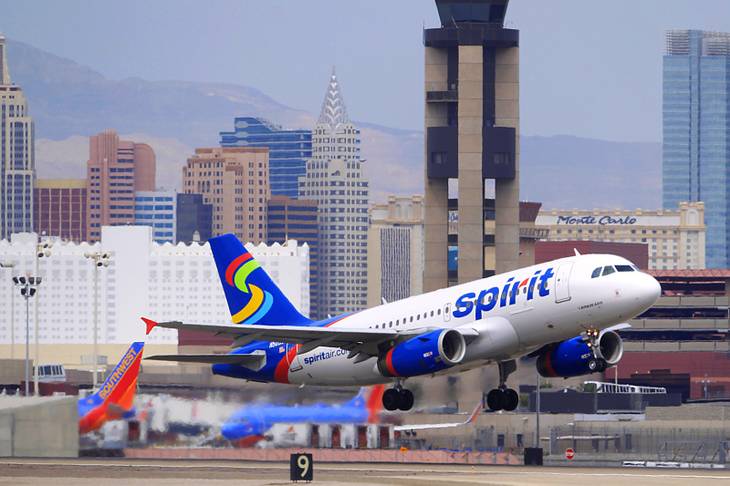The battle between discount air carrier Spirit Airlines and the U.S. Department of Transportation escalated today with the airline — the fastest growing carrier at McCarran International Airport last year — adding a new $2 fee to ticket prices to cover costs associated with new consumer regulations that took effect last week.
Miramar, Fla.-based Spirit is calling it a “DOTUC fee,” for Department of Transportation Unintended Consequences, and the airline says it covers costs to the airline for holding fares 24 hours after booking without penalty.
The Department of Transportation ordered new consumer protection rules that took effect on Thursday. Spirit, Southwest Airlines and Allegiant Air, all prominent operators at McCarran, have been the most vocal in their displeasure with the rules.
Spirit’s passenger counts at McCarran grew by 228 percent last year over 2010. Southwest is the busiest carrier at McCarran while Las Vegas-based Allegiant is poised to grow substantially in 2012 after having a 6.4 percent increase in local passengers last year.
The new rules order airlines to include all taxes and fees when advertising or displaying costs of airfares. Airlines don’t have to disclose fees that may not apply to all travelers, such as baggage and booking fees. The rules also order airlines to hold passengers’ fares when booking and allow them to be canceled or changed without penalty for 24 hours.
“People love the idea of not having to commit to a reservation, but this regulation, like most, imposes costs on consumers,” Spirit President and CEO Ben Baldanza said in a company release issued today.
“Wouldn’t we all like to eat all we want and not get fat?” Baldanza said. “Regulators like to try to sell the idea of this rule but have ignored the cost impact to consumers. You simply can’t eat all you want without consequences.”

Senate Ethics Committee Chair Sen. Barbara Boxer, D-Calif., is pursued by reporters on Capitol Hill in Washington, Thursday, May 12, 2011, after speaking on the Senate floor about former Nevada Sen. John Ensign.
Baldanza was on the receiving end of a scathing letter from Sen. Barbara Boxer of California, who criticized Spirit for emailing customers and telling them the government is encouraging airlines to hide federal taxes. It is Spirit’s contention that by requiring airlines to display the full cost of a ticket that customers won’t see how much of it is taxes and fees and how much of it is the airline’s fare.
“I have been shocked by the failure of your airline to tell the truth in an email sent to your customers earlier this week as well as warnings posted on Spirit.com that read, ‘New government regulations require us to HIDE taxes in your fares.’ Nothing could be further from the truth,” Boxer wrote.
“What the rule says is that you have to tell your customers the full cost of a ticket," she continued. "It prohibits Spirit or any other airline from advertising fares ‘that exclude taxes, fees or other charges since the major impact of such presentations is to confuse and deceive consumers.’
“And despite Spirit's claim that the airline must now hide relevant information, the rule ‘allows carriers to advise the public in their fare solicitations about government taxes and fees ...’
“Today's consumers are faced with many options when planning air travel, and being able to compare the full price before purchase is both necessary and fair. Your recent statement that ‘the better form of transparency is to break out costs so that consumers know exactly what they are buying’ is exactly what this new DOT rule will help do,” her letter said.
Airlines like Spirit, Southwest and Allegiant are more sensitive to the new rules because they traditionally have offered lower fares and the displays that include taxes and fees come across as sticker shock to potential customers.
Spirit and Allegiant have business models that offer greatly discounted fares but numerous fees for baggage, booking by phone or online and for seat selection. Southwest fares appear higher with taxes and fees, but its counterparts don’t have to disclose bag fees it doesn’t have.
